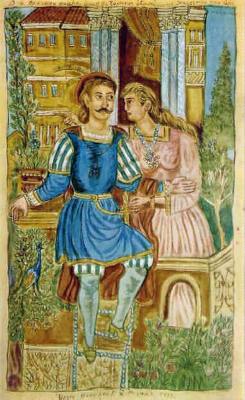
Erotokritos is undoubtedly the masterpiece of the Cretan Renaissance,
and perhaps the supreme achievement of modern Greek literature.
It is a verse romance written around 1600 by Vitsentzos
Kornaros (1553-1613). In over 10,000 lines of rhyming
fifteen-syllable couplets, the poet relates the trials and tribulations
suffered by two young lovers, Erotokritos and Aretousa
(daughter of Herakles, the king of Athens).
Caught in their love for one another, their faith and virtue are subjected to
various ordeals until they are eventually united in wedlock.
Serenades, gallant deeds, secrets and revelations, jousting, tears, finger-rings, vows of unending love, fatal duels and tournaments all serve to compose the tale of the love-sick hero and his beloved.
It was a tale that enjoyed enormous popularity among its Greek readership and succeeded in making Erotokritos something of a folk hero, whose pedigree was as brother to Digenis Akritas and Alexander the Great.
The plot of the poem was hardly original: Kornaros borrowed it
from an Italian prose translation of a standard medieval
French romance, Paris et Vienne, by Pierre de la Cypède.
However, the Cretan poet, in true Renaissance fashion,
turned the themes of love and war in the prototype entirely to
his own purposes, showing himself to be a skilled storyteller
and a sensitive interpreter of the human heart. He arranged
the plot into five parts, much like a work for the theatre, and
subtly balanced his narrative with dialogues so as to create a
rhythm that sustains brilliantly the interest of the reader.
With exemplary internal consistency and focus, he assembles
the components of his imaginary world – located in the
Greek East and centred on Athens, ‘the throne of virtue and the river of wisdom’ – in unique fashion, while his characters
are alive with real feeling and a passionate thirst for life. His
portrayals are remarkable for their rich and unaffected expressiveness,
their visual power, the extended similes, and rich lyrical
treatment of nature by which the subtlest facets of the human
soul are explored.
Kornaros does not hesitate to draw on
the Greek poetic tradition, particularly the vernacular romances,
of which Erotokritos comprises not only the natural
development but also the supreme example.